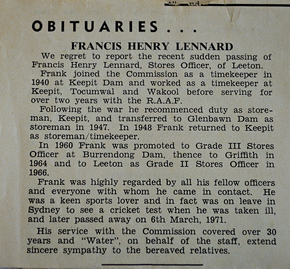LENNARD, Francis Henry
| Service Number: | 138313 |
|---|---|
| Enlisted: | 19 November 1943 |
| Last Rank: | Leading Aircraftman |
| Last Unit: | Not yet discovered |
| Born: | Birmingham, England, 8 August 1906 |
| Home Town: | Leeton, Leeton, New South Wales |
| Schooling: | Boarding School in Midlands Area England. Completed Leaving Certificate . |
| Occupation: | Stores Officer Water Resources Com. |
| Died: | Gall Bladder Complications, Sydney, New South Wales, Australia , 6 March 1971, aged 64 years |
| Cemetery: |
Northern Suburbs Memorial Gardens and Crematorium, NSW Ashes Scattered |
| Memorials: |
World War 2 Service
| 19 Nov 1943: | Enlisted Royal Australian Air Force, Leading Aircraftman, 138313 | |
|---|---|---|
| 11 Dec 1945: | Discharged Royal Australian Air Force, Leading Aircraftman, 138313 |
Help us honour Francis Henry Lennard's service by contributing information, stories, and images so that they can be preserved for future generations.
Add my storyBiography contributed by Robyn Dodd
Francis (Frank) tried to enlist three times and on the third attempt was successful. He failed at first because of his age.
He was a married man with three children.
He was deployed to New Guinea.
His first wife Enid sought out a future with another man so on Frank's return his wife had moved on and had a baby with another man.
Frank then met and married Betty Heather Schey and went on to have three children.
He returned to work with the Water Conservation and Irrigation Commission with whom he had worked prior to enlisting.
He worked on the Commisson's dam building projects and worked with the Commission until his death. He worked on Keepit Dam, Glenbawn Dam, Burrendong Dam then was moved to Griffith, then Leeton as part of the Murrumbidgee Irrigation Area.
He was a proud Australian although he moved from England at age 18 on completing his Leaving Certificate. His parents intending him to go to University to study Veterinary Science.
He came to Australia on a programme that taught young men how to farm originally to Tocumwal. He was an only child and Australia was seen as a big adventure leaving all family behind in England. He never went back for a visit.
Anzac Day was a special day for him. Originally living in small country towns he was very involved with organising marches. He was always happy on Anzac Day and would sing all the old World War II songs.
He was a proud Aussie and was proud to serve his country even though it turned his life upside down.











